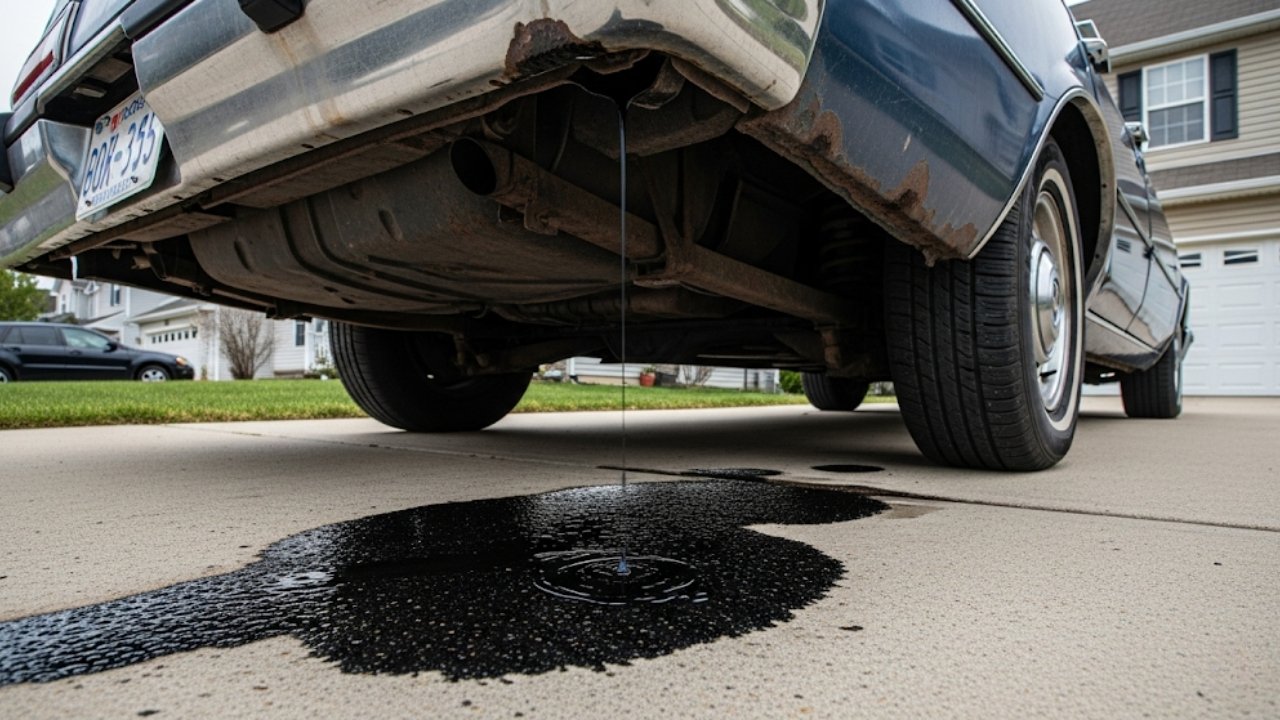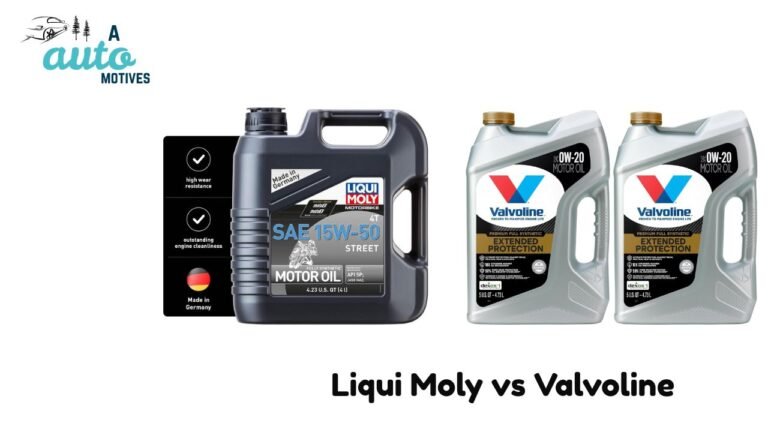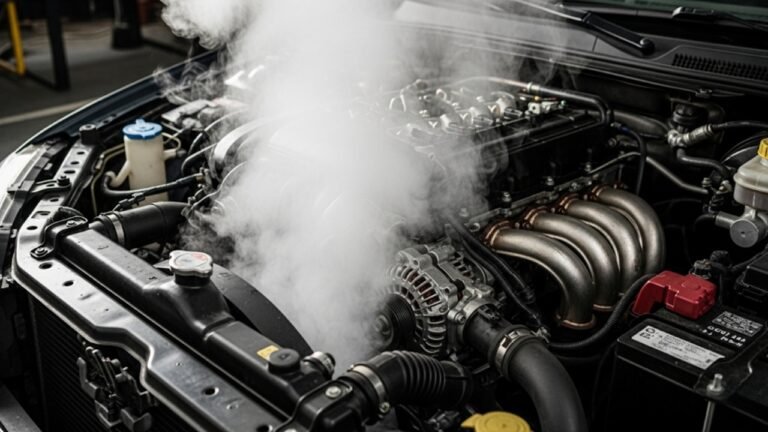Why’s My Car Leaking Oil?

Have you ever walked out to your car, coffee in hand, ready to start the day—and then splat, you notice a dark puddle under your vehicle? That moment of panic sets in, and the question hits you: “Why’s my car leaking oil?” I’ve been there, and I know exactly how frustrating it feels.
Oil leaks don’t just stain your driveway—they signal a deeper problem. It might be something small like a loose oil filter, or worse, a cracked engine gasket. Either way, ignoring it can lead to expensive repairs or even engine failure. So, let’s break this down in a way that makes sense. No jargon. Just real talk, honest advice, and the facts you need to keep your car running smooth and clean.
In this article, we’ll go through all the possible reasons why your car is leaking oil, how to spot the early signs, and what you can do about it. Whether you’re a seasoned driver or just learning about car maintenance, this guide is here to help you understand the big (and small) oil problems hiding under your car.
Oil Leaks 101: What They Really Mean

So, why’s my car leaking oil in the first place? Well, think of oil systems as a network of seals, hoses, gaskets, and filters. If any part wears out, gets cracked, or loosened, the oil finds a way out. And gravity does the rest.
Here’s a quick table to give you an idea of common causes and what they might mean:
| Cause of Oil Leak | What It Means | Risk Level |
|---|---|---|
| Worn-out valve cover gasket | Seal failure near top of engine | Moderate |
| Loose or damaged oil filter | Leaks after recent oil change | Low to Moderate |
| Cracked oil pan | Damage from hitting curbs or debris | High |
| Worn piston rings or seals | Internal pressure leaks | High |
| Damaged drain plug or washer | Worn threads or missing seal | Low |
| Broken timing cover gasket | Older engines often face this | Moderate |
| PCV system malfunction | Pressure build-up forces oil out | Moderate to High |
Each issue has its own story, but the plot is the same: oil is escaping where it shouldn’t.
The Most Common Culprits Behind Oil Leaks
If you ask a mechanic “why’s my car leaking oil,” they’ll likely start with the valve cover gasket. That’s because it’s one of the first places to wear out—especially in older cars. It sits at the top of the engine, and over time, heat and vibration can make it brittle.
Here’s what often goes wrong:
-
Valve Cover Gasket: This rubber-like seal keeps oil inside the engine head. Over time, it hardens and cracks. You’ll often see oil dripping down the engine block.
-
Oil Pan Gasket: Located at the bottom of the engine, this part is vulnerable to road debris and age. It’s a common place for leaks, especially if you live in an area with bumpy roads or gravel paths.
-
Oil Filter: Sometimes, a simple oil change can go wrong. If the filter isn’t tightened properly—or if it’s double-gasketed—it will leak.
-
Drain Plug: If you change your oil yourself, check the plug. Cross-threading or forgetting the washer can let oil seep out slowly.
-
Camshaft or Crankshaft Seals: These are deep within the engine. If they’re leaking, you might not see it right away. But low oil levels and burning smells are red flags.
When I had my first oil leak, it turned out to be a loose filter from a rushed oil change. Took five minutes to fix, but I drove around anxious for days before checking. That’s why it’s always better to look early than pay big later.
Spotting the Signs: How to Know It’s an Oil Leak
The first time I noticed a stain under my car, I wasn’t even sure it was oil. Could’ve been water from the A/C, right? But oil has a way of showing itself—and once you know the signs, it’s hard to miss.
Here’s how to tell if what you’re seeing is an oil leak:
-
Color and Texture: Engine oil is usually brown to black and slick. If it’s new, it’s golden. If it’s old, it’s dark and dirty.
-
Smell: Burning oil smells bitter and smoky—almost like charred plastic. If you notice this, your engine might be leaking onto a hot surface.
-
Location: If the leak is under the engine bay, not near the back of the car, it’s likely oil. Transmission fluid or coolant leaks show up in different places.
-
Dashboard Warning: A low oil light isn’t just a suggestion. It means the engine might not have enough lubrication.
-
Smoke or Steam: Oil leaking onto hot engine parts can produce smoke or steam. If you see white smoke, stop driving and check things out.
I always keep an old white T-shirt in the trunk. Sounds silly, but it’s the perfect tool to dab and identify fluids. Helps me catch issues before they get worse.
What Happens If You Ignore an Oil Leak?
I get it. Life’s busy. A few drops on the driveway don’t seem like a big deal. But trust me, ignoring an oil leak is like ignoring a nosebleed—it might stop for now, but something deeper is going wrong.
Here’s what can happen if you let it slide:
-
Engine Wear: Oil lubricates moving parts. Without it, metal grinds on metal. That leads to serious damage—sometimes requiring a full engine rebuild.
-
Overheating: Oil also helps with cooling. Less oil = more heat. That can warp parts or even crack the engine block.
-
Catalytic Converter Damage: Leaking oil can reach the exhaust and damage the converter. Replacing it isn’t cheap.
-
Environmental Harm: Oil leaks pollute water and soil. It’s not just your problem—it affects the world around you.
-
Fire Risk: In rare cases, oil on a hot manifold can ignite. It’s rare, but it happens.
You wouldn’t keep running a marathon with a sprained ankle, right? Same with your car. Fix the leak before it takes everything else down with it.
Quick Fixes vs. Long-Term Solutions
Sometimes people just want a band-aid. They’ll ask me, “Can I use stop-leak fluid?” or “What if I just top off the oil every week?” And sure, that might help for a little while. But it’s kind of like stuffing a hole in your roof with duct tape—it won’t hold forever.
Here’s what you can do in the short term:
-
Use oil additives that temporarily swell seals
-
Tighten the oil filter and check the drain plug
-
Top off oil frequently and monitor levels
-
Use a UV dye and blacklight to trace the leak
But for a real fix, you’ll need to:
-
Replace worn gaskets (like the valve cover or oil pan)
-
Swap out faulty filters or plugs
-
Fix cracked parts (oil pans, timing covers, etc.)
-
Repair pressure system components like the PCV valve
If you’re handy with tools, some of these can be DIY jobs. But if it’s deeper in the engine, it’s best to let a mechanic handle it.
Deeper Causes of Oil Leaks Most People Miss
Not every oil leak is obvious. Some issues hide deep inside the engine and don’t leave puddles—until it’s too late. Let’s go beneath the surface a bit and look at some lesser-known but important reasons why your car might be leaking oil.
PCV Valve Malfunction
The Positive Crankcase Ventilation (PCV) valve regulates pressure in your engine. If it clogs or fails, pressure builds up and pushes oil through seals and gaskets—causing leaks you wouldn’t expect. This one messed me up personally. I kept replacing gaskets, only to find the PCV valve was the true villain.
Symptoms include:
-
Leaks from multiple places
-
Rough idling
-
Whistling or hissing sounds from the engine
-
Oil on the air filter
Rear Main Seal Leak
This one’s tricky. The rear main seal is located between the engine and transmission—hard to access and costly to replace. It often leaks in high-mileage vehicles. If you notice oil dripping from the back of your engine or transmission bell housing, this might be your culprit.
This isn’t a DIY job. Trust me, unless you’ve got a full garage setup and a lift, let a professional take this on.
Overfilled Engine Oil
Surprisingly, too much oil can cause a leak. When you overfill the oil reservoir, excess pressure forces oil out through gaskets and seals. If you changed the oil recently and noticed a leak afterward, double-check the dipstick.
Worn Piston Rings or Cylinder Walls
These cause internal oil leaks—oil burns inside the combustion chamber. You won’t always see it on the ground, but you’ll notice:
-
Blue smoke from the tailpipe
-
Rapid oil loss
-
Poor fuel economy
This usually means the engine is getting old or tired. It might be time to consider a rebuild or engine swap.
Prevention: How to Keep Oil Where It Belongs
Nobody wants to deal with oil leaks. They’re messy, stressful, and can be expensive. The best way to avoid them? Preventive maintenance.
Here’s how to protect your engine and avoid the question: “Why’s my car leaking oil?”
1. Stick to Regular Oil Changes
Changing your oil on schedule keeps the engine clean and prevents sludge buildup. Dirty oil wears down seals faster. Use high-quality synthetic oil if possible—it lasts longer and handles heat better.
2. Inspect Seals and Gaskets
Any time you’re under the hood (even just to check fluid levels), glance at common leak points:
-
Valve cover gasket
-
Oil filter housing
-
Oil drain plug
-
Around the oil pan
Catching cracks or drips early prevents bigger messes later.
3. Don’t Over-Tighten Bolts
It sounds counterintuitive, but tightening bolts too much can warp seals and strip threads—causing leaks. Always torque components to the manufacturer’s specs.
4. Replace Gaskets When Needed
If you’re replacing a part like a water pump or timing belt, take the chance to check and refresh nearby gaskets. It’s cheaper to do it all at once.
5. Use OEM or High-Quality Parts
Cheap filters or gaskets from discount shops might save a few bucks now—but trust me, they leak faster and often don’t seal right. I learned this the hard way on a road trip with a $3 filter that cost me a $300 tow.
Real Talk: My First Oil Leak Scare
Let me get real with you. Years ago, I was driving a used 2003 Toyota Corolla—reliable, but old. I walked out one morning, coffee in hand, and saw a thick puddle under the front tire. My heart sank. I thought the car was dying.
Turns out, it was just a loose oil filter. A quick twist, a rag, and $0 fixed the issue. But that day taught me something: It’s not always bad—but you must check early. Waiting turns simple fixes into major headaches.
Quick Recap: How to Handle an Oil Leak
Here’s a bullet point summary to help you remember the essentials:
-
Check your oil level regularly
-
Look for brown or black spots under your engine
-
Smell for burning oil near the hood
-
Tighten oil filters and drain plugs after every oil change
-
Use OEM or high-quality gaskets and seals
-
Replace worn valve cover or oil pan gaskets
-
Fix PCV valve issues early
-
Never ignore a puddle—investigate it immediately
FAQs About Oil Leaks
1. Why’s my car leaking oil after an oil change?
This usually points to a loose oil filter, improperly torqued drain plug, or a missing washer. It could also be overfilled oil. Check those first.
2. Is it safe to drive with an oil leak?
Short answer: Only if it’s minor and monitored. But driving with a significant leak risks engine damage or fire. It’s better to fix it early.
3. Can I stop an oil leak with an additive?
There are stop-leak additives that swell seals temporarily, but they’re not a permanent fix. Use them only as a short-term solution.
4. How much does it cost to fix an oil leak?
It varies:
-
Minor fixes (like gaskets or filters): $50–$200
-
Major repairs (like rear main seals): $500–$1200+
Always get a diagnosis first.
5. What should I do if I see smoke under my hood?
Stop the car immediately. You might have oil leaking onto a hot exhaust. It could cause a fire. Don’t ignore it.
6. Why does my car still leak after I fixed the gasket?
Could be another gasket, a pressure issue, or a botched install. Recheck the torque specs, seals, and nearby components.
7. How do mechanics find oil leaks?
They often use UV dye and a blacklight, or pressure tests. It helps pinpoint hidden leaks in tight spots.
8. Can engine heat make an oil leak worse?
Absolutely. Heat expands metal, softens seals, and increases internal pressure—all of which make leaks worse over time.
Final Thoughts: Oil Leaks Don’t Have to Be a Mystery
It’s easy to panic when you see that stain on your driveway. But here’s the good news: most oil leaks are fixable, preventable, and not as scary as they seem—if you catch them early.
So next time you ask, “Why’s my car leaking oil?”—remember, you’ve got the knowledge now. Look under the hood. Watch for signs. And don’t wait until your engine’s crying out for help. Your car takes care of you—so take a few minutes now and then to return the favor.
And if you’re ever in doubt? Get it checked. Trust your instincts. A small leak today could be a major repair tomorrow. But with a little awareness and effort, you’ll keep your car running smooth, clean, and leak-free.






